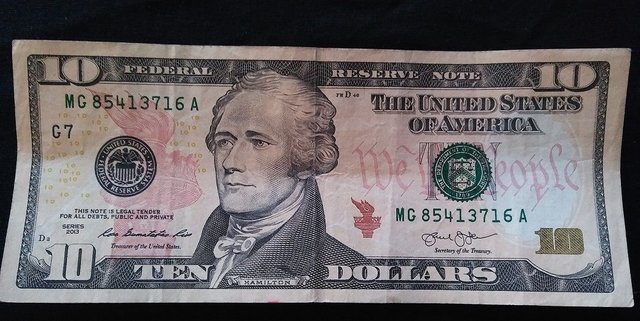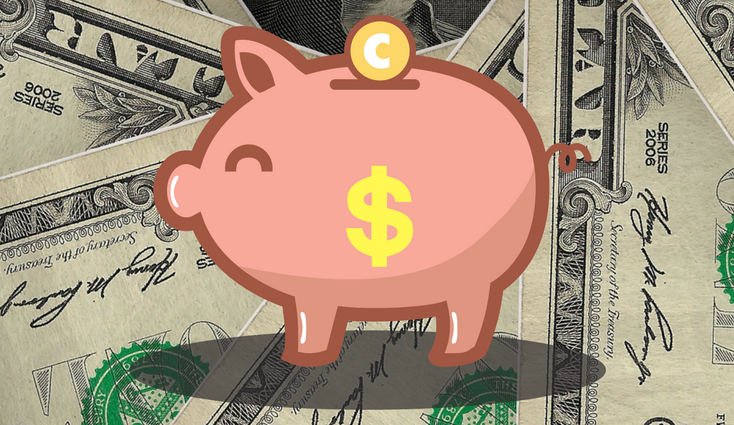How A Peanut Butter Sandwich Saves Me 2.5 Workdays Every Year

It’s important to understand the power of small amounts over time.
Just today I had a chance to teach one of the young guys at work a lesson on this.
He came into my office to ask about something and he noticed that I had some bread out. I had been just about to make my morning peanut butter sandwich. He commented on the bread saying “Are you going to just eat plain bread?”
I said no, and pulled out a jar of peanut butter from my desk cupboard and began to spread it on one slice. He asked if I do this often, I said I did.
Watching, he said “I just make my breakfast at home and bring it in, it only takes 5 minutes.”
Only 5 minutes.
I sensed an opportunity to pass on some wisdom.
I said, "Sure, 5 minutes ONE time isn’t much. But consider that I normally go to work 5 days per week and there are 4 weeks per month. Twelve months in a year."
5 minutes X 5 days = 25 minutes
25 minutes X 4 weeks = 100 minutes
100 minutes per month X 12 months = 1200 minutes
1200 minutes is 20 hours.
Certainly 20 hours of time per year spent making breakfast is better spent during work time than personal time (if your work is ok with this, as mine is).
In one year I claw back 2 ½ days worth of time from just 5 minutes per workday.
Maybe that still doesn't impress you. How about realizing that if I did this simple action for 20 years it equates to 50 DAYS worth of work time spent on breakfast preparation.
Amazing, isn't it? All from just 5 minutes per workday.
And people wonder why I hesitate to show up 15 minutes early to work every day. It's because I can do simple math like this.

MONEY
It's important to realize that the effect of small amounts is even more important in your finances due to the ability of money to compound when invested.
To maximize my savings by decreasing my spending I have adopted the frugality mindset.
By finding deals and saving where I can in my normal daily, weekly, or monthly transactions I am harnessing the power of small amounts. These small amounts are accumulated and eventually become large amounts.
Most people only think about the big things and when it comes to the smaller expenses, like $10 on lunch everyday, they think it doesn't matter.
Little do they know that it only takes $10 per day invested at 8% for 40 years to equal a million dollars due to the compounding nature of investments!
I realize that a one time cost of $10 doesn't change your future, but when that cost is continuous it is important to understand the long-term results.
Something as simple as saving $10/week on groceries will save you $520 per year. You can easily save that much by using coupons (paper or store app), buying deals, or using the store brand items instead of the more expensive name brand.
If you invested that $520 at 8% for 40 years you will have saved up $145,486.14!
Now imagine if you can find multiple areas to save just $10/week? If you can find 10 places in your life to save $10 every week, then you will have almost $1.5 MILLION dollars from this simple act (using the above math)!

SECURITY
These simple savings can quickly add up. In a recent survey, it was found that 36% of Americans would have to go into debt to pay for a $1,000 unexpected expense.
Another survey found that 44% couldn't cover an unexpected bill of just $400 without using debt.
Whichever survey is closer to the truth doesn't really matter. What matters is that somewhere near 1/3rd to 2/5ths of Americans have basically zero financial-security.
I don't know about you, but unexpected expenses seem to pop up every once in a while. I also don't like to live on the edge of the financial blade. It doesn't make for a nice, carefree sleep at night.
Yet those people do nothing about it. They do nothing to break the cycle. They can't control their impulses.
And that's what saving all these small things really come down to – being in charge of your own mind.
I mean I am not talking about a lot of 'sacrifice'. I am sure that nearly all of those people can save $10 per day if they chose to actually do the small effort of stopping and thinking about how they spend their money.
That daily $10 being spent on things that don't matter to make their lives seem less shitty IS NOT WORKING.

What Works
Do you want to know how to start on the journey towards a better financial future?
Have an intense desire for something that requires you to save and invest money instead of spend it.
When you have that desire, you can more easily shed the things that don't matter.
I'm not saying you can't spend money. We all have things that do bring us real, if temporary, joy. I like to buy a PC game on Steam every now and then. You might want to go out every other weekend. Someone else might have a list of countries that they want to visit.
You can do what you want when you aren't spending money on things that don't matter. You just can't do EVERYTHING.
You have to chose what is or is not important.
Then what is important you find a frugal way to accomplish it. For me, it is to wait until the game I want is on sale.
Someone that wants to visit many different countries might learn how to travel hack. You can get everything cheaper if you think about it.
So don't just save that $10 to save $10. You save that $10 to, first, get you off that financial edge with a decent emergency savings account. Then you use that money to work towards your goal.
Your life will become A LOT less stressful once you have a laid out a path towards the future you desire.
Conclusion
So how does all this money talk translate back into time? Well, I did some thinking years ago and figured that if I could save MORE than $10 per day I could speed up that time until I had enough.
Once I had enough invested and passive income coming to me every month I no longer have to go work.
Say instead of saving just 5 minutes per workday by making that peanut butter sandwich I saved 8 hours every weekday from not being at work because I achieved financial independence after 20 years on the job.
8hrs X 5 days per week = 40hrs
40hrs X 52 weeks = 2,080hrs
2,080hrs X 20 years = 41,600hrs
41,600hrs is 1,733.33 days
That's a lot more than the 50 days I would get back from making a sandwich.
Life is not just only about work at office or earning/saving money. A person who spend more time at the office is not a hardworking person, Instead is a fool who does not know how to manage work within the stipulated time. He/She is inefficient and incompetent in his work. You did not study hard and struggle in life to become a machine. Working smart should be the strategy and give the remaining time to the family and your own body by preparing healthy food or doing workout...After all health is the true wealth, so eat healthy.. stay healthy!
@hms818 Thank you for this thoughtful comment. I have to admit when I was a Broker in the Financial Industry I spent way to much time at a desk staring at clients accounts and stock trades.
Thanks @stokjockey for the appreciation ... Why are we running after money when we know happiness and health is more important...
This is why I am focused on breaking free from this work cycle as soon as I can now. :)
Time is money and how we value that time will determine how efficient we function. Very good post Resteemed!
Cheers
Dante
Thanks for the resteem, Dante!
Very wise indeed. :)
:D
This makes a lot of sense... 20 hours is a lot of time that can be used to influence a purpose you have in life.. be it at work, training for an upcoming tournament for the sports people, innovating something that could bring you some income. We end up putting to waste 50 days in 20 years when we don't make the small things count in life.
How many people save upto $520 a year, how many have a million dollars in their accounts after 40 years of active working in their professions. This is where the math is. $10 at the moment is too small for one whose bagging a good amount at the end of the month, but then these same people have accumulate loans that could be covered by the same amount when it multiplies.
Thanks for reminding the world that people are actually not poor @getonthetrain.. It's just their mindset that is. People need to make a choice of parting ways with spending money.
Indeed the easiest way to do this is have an intense desire for something that requires to save and invest money. Having a list of priorities that actually require spending will lessen this outrageous spending on things that don't matter in our lives.
You can adjust the numbers to fit a normal amount of money in your country, but the main point is that all the little things add up. Time and money both. Be a good steward of your resources and don't squander them just because it is a little amount.
The slight edge, ever read that book, taught me something.
A penny saved is a penny gained. With money i realized the rich are those who understood the power of compound interest, it's amzing how we sometimes forget about it.
Absolutely, just as you said, the money we spend on usual things that aint so useful too compounds up, we realize after a year that we wasted a little too much dollars in things that don't really matter.
Just like a business, we tend to undermine it's beginnings, it's until we build it up after a long time that we look back and be glad we persisted with discipline.
So the peanut butter sandwich saved you alot, it seemed insignificant until it happened over and over for some time.
This is a nice one, loved it.
Thanks, so many people disregard the small stuff but that is exactly where they are getting hurt the most!
I think some did not understand the concept of their message, what I understood, maybe this is wrong, it's not just about saving, but that little can mean a lot, and a lot can be very little, about how with just one grain of sand you can end up changing it everything, and above all, that with just a few small changes in your life you can make it better.
You can save a lot of money by reducing some relatively insignificant expenses, you can save a lot of time if you manage it well, but you can also use it in reverse and spend little time doing things you want to do, such as learning French or doing some exercise, and long, you will also see good results.
Yes, save time/money on things that don't matter or that you can cut back without missing and then use that time/money in areas that matter a lot to you.
Smart!
This is really well written buddy and while the advice is simple, it's also very powerful.
I admit to there being plenty of improvements I could have made to be more frugal in the past, but these days I'm better at it - Steemfest 3 won't be cheap and by looking after my funds I should hopefully be on my way to the event this year.
Good stuff!
Hey, if SBD's hold up until tickets go on sale it won't take very many of them this year! You will only need to save up a few each day to have enough.
Small things, when you try to accumulate small things, the effect is big. I often do this while I was working in the government. It helps me not get late because the travel time to work is almost one hour. Thanks to the worsening traffic condition in our city. Furthermore, I also save time because I put my make up on at the office's comfort room. Do not worry, I usually come to work thirty minutes earlier, meaning I had more time to think things thoroughly on how I am going to face all the work load.
For now, as a fulltime blogger on steemit, the usual time I allocate on facebook is now spent on helping beginners on steemit or rather making more art commissions.
Time = Money
Oh yeah, the amount of time that traffic eats up can be enormous! I could tell you the monetary cost, but it might be mind-blowing.
In principal, I agree with most of these thoughts. I tend to be quite frugal myself.
But, I aim for larger lifestyle changes that let me keep smaller luxuries because they save me so much. For example, I hunted for a career that I could always do from home so that way I could save on commute time, work wardrobe, food, and overall stress.
I spend on wellness (yoga, healthy food, vitamins) in the hopes that I won't have to spend money on expensive medicines in the future.
I cook nearly all of my meals as opposed to eating out. That way my husband and I can take small trips every once in awhile.
I live in an inexpensive area and drive an old car. That lets me buy things like musical instruments (I have two, violin and mandolin), cultural outings, and other leisure activities.
I care less about the small calculations, and more about what adds up to bigger picture happiness and fulfillment.
Yes, you get it and you see the power of the small things over time.
In health you mention you do yoga to lessen your ill health - that is you doing good actions over time to add up to a very healthy body. There are people that do the opposite, small junk food or inaction for long periods of time add up in the negative.
So this principle works both ways.
Very smart way to save. Einstein said, “Compound interest is the most powerful force in the universe.”
Smart man there